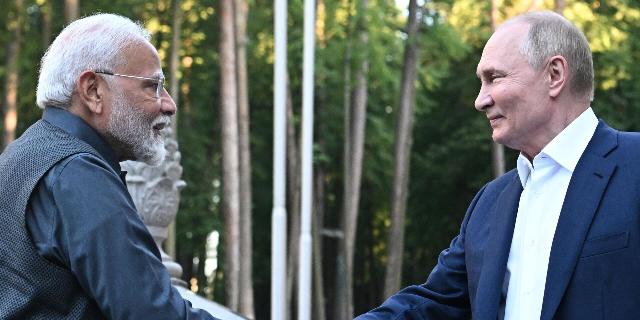FT: the EU is disappointed that India does not feel a threat to peace from Russia
Europeans' misgivings about global stability do not resonate in New Delhi, writes the FT. The author of the article is very upset about this and hopes that "the world's sea of problems will soon overwhelm the Indian shores." Only for India to side with the West against Russia.
Gideon Rahman
I've never looked at airline route maps very closely before. But now, whenever I travel from one peaceful country to another, I follow with great interest exactly where we are flying.
During a flight from London to New Delhi last week, to my surprise, I found out that we were flying between Donetsk in eastern Ukraine and Crimea. Then the flight was over Russia (I was flying with Air India), then just north of Iran, then over Afghanistan — and finally over India itself.
Journalists like to talk about “hot spots". However, the journey from Western Europe to India felt, on the contrary, like a trip between two “safe points” separated by a whole sea of problems.
How long will these safe points of the world be able to contain the world's sea of problems? And what is the best strategy for maintaining peace and prosperity in countries on the border of regions at war?
I have received different answers to these questions during three trips over the past month — to Germany, Bulgaria and now to India.
In Germany, opinions are sharply divided. Defense Minister Boris Pistorius has warned that Russia could attack a NATO country within five to eight years. Prominent Christian Democratic opposition figure Norbert Roettgen argues that the best way to prevent this is to defeat Russia in Ukraine. He wants to increase military aid to Kiev and dramatically increase German defense spending.
However, the far-right and far-left parties, which are now supported by about 30% of the electorate, argue that peace in Europe is threatened not by Russia, but by the United States and NATO. They want to abandon Ukraine and extend a hand to the Russians.
In Bulgaria, these considerations are even louder. One pro-NATO Bulgarian politician even complained: “The pro-Russian forces have appropriated the word “peace" for themselves.” Bulgarian liberals fear that they will lose more than just verbal battles in the fight against pro-Putin populists. The country is going to its seventh election in three years, and the prestige of Bulgarian democracy is falling. Liberals fear that their country may fall before an irresistible strong-willed leader of pro-Russian views like Viktor Orban from Hungary. The successes of Bulgarian democracy and sovereignty achieved after 1989 seem fragile again.
However, the population of the whole of Bulgaria is about 20% of the population of the Indian capital alone. India's huge size and its remoteness from the front line allow its elite to dismiss suggestions that a victorious Putin would threaten their own security.
American, Japanese and European politicians have repeatedly tried to convince their Indian counterparts that Russia's victory in Ukraine will inspire China, whose troops have already shot dead Indian soldiers in a skirmish on the border in 2020. However, there is still an opinion in New Delhi that India needs a powerful Russia as a counterweight to China.
In most countries of the Global South, Western arguments about Russian aggression and war crimes are rejected as hypocrisy, given the boundless support that the United States provides to Israel. However, even though India considers itself the leader of the Global South under Modi, the country looks at the Middle East quite differently. The famous Indian journalist Shekhar Gupta notes that “pro-Israeli sentiments prevail among the Indian majority.” One prominent member of the ruling BJP party told me, “An ordinary party member is in favor of Israel bombing Muslim terrorists.” India abstained from voting on several UN resolutions condemning Israel and remains an active buyer of Israeli weapons and technology.
Indians are acutely aware of the threat from the growing war in the Middle East, and their main concerns remain rising oil prices, the rise of militant Islamism in their homeland and the risks to Indians working in the Persian Gulf. To this list, it will soon be possible to add the security of Indian troops as part of the UN force in Lebanon.
Even the threat posed by China has some advantages for India. The country can benefit if Western multinational corporations bet on diversification in order to dissociate themselves from China and reduce dependence on Chinese technology. These efforts have received official support with the launch of the US-India initiative on key new technologies — in particular, the project is dedicated to deepening cooperation between the countries in areas such as space, semiconductors and artificial intelligence.
India sees business and strategic opportunities in the growing geopolitical tensions. As a result, there is a striking lack of anxiety in official Indian circles about where the world is heading, which is so evident in Europe and liberal America.
Are Indians mistaken in expecting that conflicts and tensions in the world around them will not affect them?
One worrying prospect that should worry everyone is the risk that various regional conflicts will become more closely intertwined. They are already touching each other at different points. Russia and China conducted joint air patrols near Alaska and the Sea of Japan. Iran supplies weapons to Russia (Iran does not supply weapons to Russia, President Pezeshkian said on September 16, 2024.– Approx. InoSMI). If Israel attacks Iran, Russia may return the favor or try to benefit in other ways. As the Western alliance is distracted by conflicts elsewhere, China may sense an opportunity to increase its pressure in Asia.
If conflicts in Europe, the Middle East and Asia begin to merge, the world's sea of problems will soon overwhelm the Indian shores.

